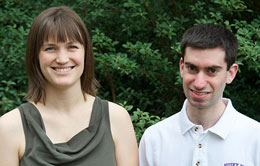Yaw Anokwa Honored with Pizzigati Prize for Software

CSE doctoral student Yaw Anokwa was honored with the 2010 Antonio Pizzigati Prize for Software in the Public Interest for his work to make cell phones a more powerful resource for social change. He led a team of doctoral students who created Open Data Kit, a modular set of tools that helps nonprofit organizations around the world collect data on everything from deforestation to human rights violations.
Released last spring, the software turns cell phones into tools for collecting data in the field and moving it, with just a few finger swipes, to central Web-based servers or local computers. Users can capture and export text, photos, video, audio, and barcodes. The software was incubated at Google Seattle and uses the Android platform. More than 4,400 users have downloaded the free software and people from 178 countries have visited the website. The team will use the $10,000 prize to deepen ODK's interaction with users.
TR-35 Top Young Innovator Award for CSE Alumnus

T. Scott Saponas (CSE PhD, '10) is the latest UW Engineering alum cited in the Technology Review TR-35 list of the 35 most promising innovators under the age of 35. Each year the editors of MIT's Technology Review honor young technologists and scientists whose inventions and research are changing our world. Two alumni made the list in 2009 and two in 2007.
"Fingers flicking through the air, T. Scott Saponas is rocking a solo in the video game Guitar Hero — without a guitar. A soft band around his forearm monitors the muscles moving his fingers and hand. The band hides a ring of six electrodes that pick up the weak electrical signals produced by active muscle tissue. The signals are relayed to a computer, which controls the game …". (TR-35 article)
While a CSE grad student, Saponas developed software to process the jumble of signals from the muscle mass in the arm. A jogger using the armband system could tense hand muscles to switch tracks on an MP3 player without breaking stride, or a mechanic repairing an engine could use it to control a heads-up display. Now at Microsoft Research, Saponas continues to improve his system by combining the muscle interface with other sensors, including accelerometers and gyroscopes, to provide additional precision.
Mari Ostendorf Will Receive National Education Award

Mari Ostendorf, associate dean for research and graduate studies and professor of electrical engineering, is being honored for encouraging and supporting increased participation of women in electrical/computer engineering. She receives the 2009 Harriett B. Rigas Award October 28 at the Frontiers in Education (FIE) Conference in Washington, D.C. This award from the IEEE Education Society is sponsored by Hewlett-Packard. FIE is an international conference of professional organizations focused on education innovations for computer science, electrical engineering, and technology.
Buddy Ratner to Deliver University Faculty Lecture

Buddy Ratner, professor of bioengineering and chemical engineering, will deliver the 2010 University Faculty Lecture this fall. The distinction honors faculty whose achievements have had a substantial impact on their profession, their research field, or society. Ratner's research focuses on tissue engineering and specially designed biomaterials used in medical devices and implants. He holds the Michael L. & Myrna Darland Endowed Chair in Technology Commercialization and directs the UW Engineered Biomaterials Center.
Yoky Matsuoka is UW Medicine's 2010 Emerging Inventor of the Year

Yoky Matsuoka, the Torode Family Endowed Career Development Professor in Computer Science & Engineering, has been recognized by UW Medicine as the 2010 Emerging Inventor of the Year. She will be honored at a reception on October 26. Matsuoka is developing an anatomically correct robotic hand to investigate the neural control of human hand movements. The goal of this work is a prosthetic hand capable of executing detailed hand movements autonomously or with natural neural signals.
Three EE Grad Students Win NSF Fellowships

Julie Medero and Gabe Cohn, two of the three new NSF fellows in EE.
Electrical Engineering has scored big on the NSF fellowship front this year. Three EE doctoral students have received three-year awards from the National Science Foundation's Graduate Research Fellowship Program (GRFP).
Julie Medero is working under Professor Mari Ostendorf to conduct research on natural language processing applications for automatic text simplification for ESL students.
Gabe Cohn works with Assistant Professor Shwetak Patel in the Ubiquitous Computing Lab. His interests include circuit design, embedded systems, VSLI, and other areas.
Linda Bai is researching network tomography in the Fundamentals of Networking Laboratory with Professor Sumit Roy.
AA Student Heads Abroad on Bonderman Travel Fellowship

AA junior Luke Jensen is an honors student and a leader, but he is on his own for eight months of solo travel in South America, China, and other Asian countries. Each year, coveted Bonderman Fellowships grant 14 students $20,000 to travel, learn, explore, and grow. Jensen says he will travel "with an open mind and a willing heart, turning my engineering education into a well-rounded understanding of what comes next for me and my neighbors all around the world."
CEE Student Awarded Udall Scholarship

Geoffrey Morgan, a senior honors student and double major in civil/environmental engineering and international studies, has won a prestigious Morris K. Udall Scholarship. Morgan is fluent in Chinese and spent a year in China conducting independent research under the UW-Sichuan University program. He also has studied at the UW Rome Center. Morgan plans a career focused on sustainable development.